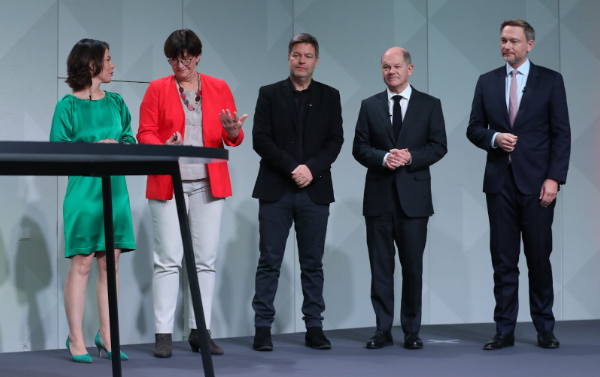Dead Stop: The end of German traffic light government
By Anna-Magdalena Glockzin, 3 minutes.
The 6th of November 2024 was a memorable day. Not only was there the result of the elections in the United States of America (USA), which Donald Trump won by a land-slide victory, but also the break-up of the German traffic light government. In the evening of that day, the German Chancellor Olaf Scholz (Social Democrats) made headlines when he announced that he fired his finance minister Christian Lindner (Liberals). This meant that the traffic light government had failed, leaving Germany in an uncertain state in times of crisis and global threats. Scholz addressed the nation in a press conference in the late evening of the 6th of November, stating that he “would have liked to have spared [the people] this difficult decision” and that he was aiming for new elections in January 2025.
Parties of the traffic light coalition sign the coalition contract in December 2021 with Annalena Baerbock, Saskia Esken, Robert Habeck, Olaf Scholz and Christian Lindner (from left to right)
By Sandro Halank, Wikimedia Commons, CC BY-SA 4.0, CC BY-SA 4.0, https://commons.wikimedia.org/w/index.php?curid=113153548
But how did it come about? The German traffic light government was formed after the national elections in 2021 and is a coalition of the Social Democrats (red), the Liberals (yellow), and the Greens (green), hence its name. Since the beginning of its term, the government has been in conflict about a variety of issues, also because it proved quite difficult to find a consensus between social-democratic, liberal and environment-focused perspectives. Additionally, the government saw itself confronted with a polycrisis, nationally and globally. Russia’s full-scale invasion of Ukraine, the energy crisis, the migration crisis, and a weak economy are a few examples of the challenges the government had to manage. In the last few months, disputes between the parties increased, particularly on the topic of the budget, leaving the government more or less unable to act. The main question was about how to deal with the lack of billions of euros needed for the government budget. Scholz and his Vice Chancellor Robert Habeck (The Greens) considered a suspension of the debt brake the only solution, in order to guarantee social expenditures and the achievement of the government’s climate goals. Lindner, however, insisted on complying with the debt brake, because it is anchored in the constitution. However, at this point in time, it would lead to massively cutting down expenses for social and environmental goals and projects. The financial proposal, issued by Lindner a few days prior to the collapse, and which quickly found its way to the press, laid out demands that were far beyond anything that the government had agreed upon earlier. Therefore, Linder‘s proposal has been regarded as a provocation, further exacerbating the relations between Scholz and Lindner particularly and finally leading to the end of the traffic light government in Germany.
The question Germany is left with is “what happens next?” Chancellor Scholz announced new elections for the Bundestag which will be held on the 23rd of February. In mid-December, Scholz is expected to face the vote of confidence in the Bundestag. If he loses the vote, then he can recommend the Bundespräsident Frank-Walter Steinmeier to dissolve the Bundestag and the preparations for the new elections can start. These are very extensive and take time, which is one of the reasons why the new elections could not be scheduled any earlier (like the opposition parties demanded). The authorities have to print voting documents, organize polling stations, recruit helpers and organise the postal vote. The parties’ candidates for the position of Chancellor are mostly known: Friedrich Merz will be the candidate for the Christian Democrats, Robert Habeck for the Greens and Alice Weidel for the extreme right-wing party Alternative for Germany (AfD). After major successes in the state elections in Saxony and Thuringia a few months ago, the AfD is expected to score highly in the new elections. The Christian Democrats are also doing well in the polls. Therefore, it is highly probable that Germany‘s Bundestag will experience a shift to the right, following the trend of other European countries in recent elections.
